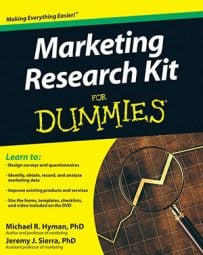Conducting marketing research involves working with professionals who use a variety of terms to describe the parts or steps of the research process. The following are common terms you’re likely to encounter in your research, along with definitions.
-
Close-ended question: A survey question that asks you to choose from a variety of answers — like a multiple-choice question.
-
Data: The actual measurements that you get from your research.
-
Focus group: A small-group discussion, led by a moderator, about a research question.
-
Mean: Used to measure the center, or middle, of a numerical data set. It’s the sum of all the numbers divided by the total number of numbers. Also known as the average.
-
Median: Like the median on a road, it’s the true center of a numerical data set, or the middle-ranked value or score on a variable (the 50th percentile).
-
Mode: A detail, such as value or score, that occurs most often in a given set of data.
-
Nonprobability (nonscientific) sample: A research sample that reflects information only of people who choose to respond; the probability of selecting certain population members is unknown.
-
Open-ended question: A survey question that you answer in your own words, instead of choosing from a list of responses.
-
Probability (scientific) sample: A research sample that reflects information that can be proved with very little or no margin of error. The circumstances under which questions are asked are so rigid that they enforce the truth; the probability of selecting certain population members is known.
-
Reliability: The accuracy, precision, and consistency of information being measured.
-
Response bias: A conscious or subconscious tendency to not respond truthfully to research questions.
-
Response rate: The number of research questionnaires completed divided by the number of eligible respondents who were asked to participate in a survey.
-
*Test market: A controlled experiment that mirrors actual market conditions.
-
Validity: The accuracy of a measure; the degree to which a score accurately captures the type of information being sought.
-
Variable: A quality or quantity that can change from person to person (such as annual income) depending on the type of information being gathered.
Whenever you encounter information from research professionals that doesn’t seem clear, be sure to question the people you’re working with for further explanation or clarification. It’s important that you know exactly what’s going on in a study in order to achieve your marketing goals and improve your business.

